Scottish exporters 'disappointed' over Trump tariffs
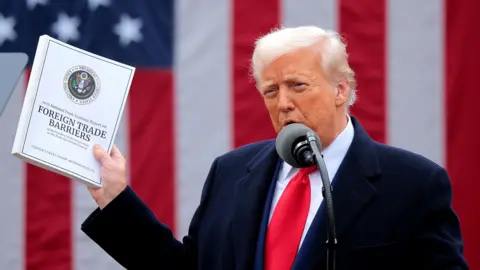 Getty Images
Getty ImagesScotland's biggest exporters to the United States have expressed disappointment with Donald Trump's new 10% tariffs and called for negotiations to continue.
The US President unveiled plans at the White House which will see the import tax apply at varying rates for different countries, affecting products like whisky and salmon.
One distillery owner told BBC News the announcement was a "big blow" for the industry, which counts the USA as its most important market.
First Minister John Swiney said the new levies would be "very damaging" for the Scottish economy.
He added that he hoped Trump's "deep personal connection to Scotland" could help it avoid some of the trade barriers.
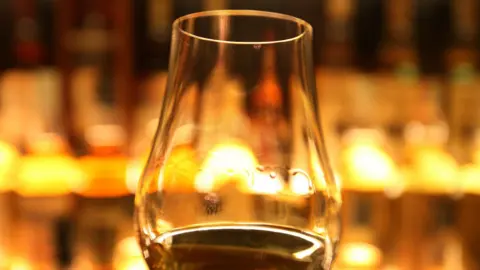 PA Media
PA MediaTrump claimed the tariffs would encourage Americans to buy more goods made in the US rather than overseas, and dubbed his announcement "liberation day".
The US is an important market for many Scottish goods, and accounts for 17% - just under £4bn - of Scotland's total export value.
America is the the largest export market by value for Scotch whisky, with 2024 figures showing the market was worth £971m to the industry.
The Scotch Whisky Association said it was "disappointed" by the announcement.
A spokesperson added: "We welcome the intensive efforts by the UK government to reach a deal with the US administration, and we continue to support this measured and pragmatic approach towards a mutually beneficial resolution."
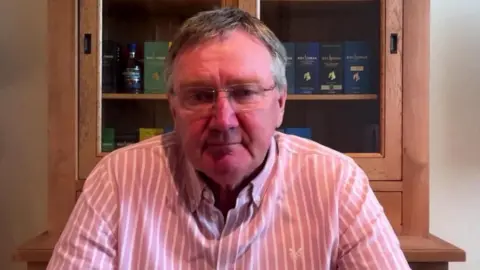
Anthony Wills, who runs the Kilchoman distillery on the Isle of Islay told BBC News the new tariff would have a big impact on the whisky industry.
He said: "For us personally, it represents 10% of our sales. So it's clearly going to be a big blow, especially with the current economic headwinds that we're all experiencing, we're all going to find this very difficult and very challenging."
Single malt whisky was previously hit with a 25% tariff in 2019, during the first Trump presidency - a decision later estimated to have cost the whisky industry around £600m over a two-year period.
That tariff came about due to a battle between the US and the EU over subsidies for plane makers Airbus and its American rival Boeing, a dispute that was settled in 2021.
Mr Wills said he split the cost of the tariff with his US importer last time, so the price would stay the same for their American customers, and expected he would be forced to do the same again.

In the Upper West Side of New York City, Jeff Winslow, originally from Greenock, serves drinks at the Caledonia bar which specialises in Scottish whisky.
It currently has more the 130 different single malts on the shelf.
The bartender told BBC Scotland News that price rises were inevitable - with a typical dram already costing customers about $20.
As American produced bourbon and rye do not face tariffs, he said the bar could pivot towards these spirits as a cheaper alternative.
Salmon producers still 'confident'
Scotland's salmon industry is another major exporter affected by the levy.
In 2024 America was the second most common destination for Scottish salmon, behind only France, with £225m worth of exports, out of a total of £844m, heading across the Atlantic.
Tavish Scott, the chief executive of Salmon Scotland, said the sector had "great confidence" Americans would continue to buy their product.
He added: "Salmon producers want a business-like and stable trade relationship with the USA, so we support the UK government's efforts to achieve that outcome through a calm and measured approach."
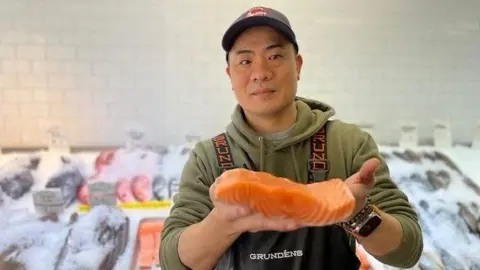
In New York, Steven Wong runs a Manhattan fish wholesaler where he sells Scottish salmon, caught in Wester Ross, every week.
He told BBC Scotland News that he thinks his customers will stick with the product since he supplies Michelin starred restaurants.
"I will have to just pass on the cost of the taxes to restaurants and consumers," he added.
Mr Wong said it was a "nerve-wracking" time to be running a business that imports from across the world.
Making the announcement at the White House, President Trump said it would raise "trillions and trillions of dollars" very quickly and claimed that other countries had historically "raped and pillaged" America's industry, calling them "cheaters".
He repeatedly insisted that the import taxes would lead to huge wealth for America and would put the country first, as well as praising his own leadership.
The 10% figure is the "minimum baseline", with some other countries being charged higher rates.
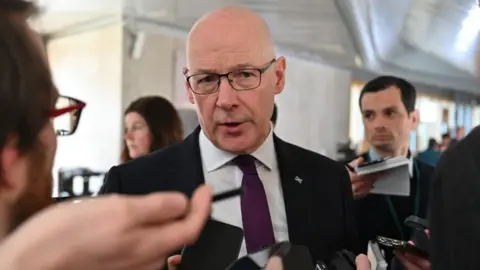 Getty Images
Getty ImagesFirst Minister John Swinney said: "There should be no relief taken from the fact that the tariffs are only 10%.
"These represent significant barriers and obstacles to trade for Scottish companies and businesses in a market that is fundamental to the economic prospects of Scotland."
He said he was "not confident" the UK government would be able to secure a better deal, but said it should not stop Downing Street from "trying".
The first minister said Scottish ministers would continue to make "strong representations" to the UK government on behalf of businesses.
Swinney said he hoped Trump's "deep personal connection to Scotland" - where his mother came from - would help in negotiations about tariffs.
The first minister added: "I hope that some of these connections can be developed and encouraged and nurtured to try to ensure that we can get into a better position.
"And we should leave no stone unturned in trying to avoid economic damage."
Swinney spoke before travelling to the US to attend Tartan Week celebrations in New York.
A spokesman for the first minister said no attempts had been made to meet anyone in the US administration to discuss trade.
The SNP leader had a telephone conversation with Trump in December shortly after his presidential election victory. He also met Eric Trump at Bute House in Edinburgh last month.
Trade war fears
The Fraser of Allander Institute think-tank earlier this week downgraded forecasts for the Scottish economy, citing "growing unease" among firms - in part due to the concerns about tariffs.
Prof Mairi Spowage, director of the Institute, said the economy was likely to remain "turbulent and uncertain" throughout the year.
Prime Minister Sir Keir Starmer said he would rule "nothing out" regarding the tariffs but added that he would hope to avoid a "trade war" between the countries breaking out.
President Trump has regularly championed tariffs as a way of boosting the American economy, to the extent that his aide Peter Navarro recently claimed they could raise £6tn for the American economy over the next decade - despite widespread fears it could raise domestic prices and increase inflation.
A new import tax of 25% on all foreign-built cars was also announced by Trump, coming into effect at midnight local time.
A flat duty on all steel and aluminium entering the United States was raised to 25% last month.
Shortly before the president's announcements, businessman Sir Tom Hunter told the BBC's Scotcast podcast that the push for tariffs didn't make sense to him and that it would "cause havoc".
He said: "In terms of global trade tariffs put prices up, they slow economic growth, they cut growth for the companies involved, they create unemployment and they create global tensions."
